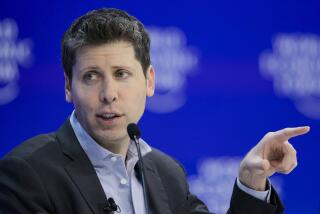Stem Cell Agency Cuts Its Inaugural Agenda
- Share via
The first meeting of the state’s $3-billion stem cell agency -- scheduled for today in San Francisco -- was significantly scaled back at the last minute after public interest lawyers complained to Atty. Gen. Bill Lockyer that it would violate California’s open meetings law.
Board members no longer will consider a range of topics relevant to the start-up of the new agency. Instead, they now will vote only on the chairperson and vice chairperson of the California Institute for Regenerative Medicine.
The need to revise the kick-off meeting on the day before it was to be held is the first misstep for an agency that will distribute $300 million a year in the controversial field of embryonic stem cell research, a voter-approved investment certain to garner widespread scrutiny.
Assemblywoman Loni Hancock (D-Berkeley), who had contacted Lockyer’s office about the objections, said she welcomed the changes.
The questions about the legality of the first meeting came amid other concerns that have been raised about oversight of the institute, which is largely immune from legislative controls. Many guidelines have yet to be set for the agency, including requirements for public disclosure, conflict of interest, grant writing and ethics.
In addition, some people have expressed concerns that the sole nominee for chairman, real estate developer and attorney Bob Klein, has no scientific background. Klein, who has said he wanted to get the first grants to researchers by May, ran the successful multimillion-dollar campaign to pass the ballot measure.
“Given the post-election controversy,” Hancock said, “I would hope the committee would want to follow the established procedures carefully and ensure maximum transparency.”
The decision to change the agenda came after aides to Treasurer Phil Angelides and Controller Steve Westly said Wednesday that the process had been overseen by counsel for their offices as well as for the attorney general and would proceed as planned.
On Thursday, Angelides aide Dan Newman said: “It will be a short meeting ... based on new advice from the attorney general’s office.” But Lockyer’s aides said it was inaccurate to imply that their office had ever advised clients that 48 hours’ notice was sufficient for the proposed agenda. The attorney general has to advise multiple clients in this case, representing the interests of the new agency, as well as Angelides, Westly and the state’s citizens.
Aides to Lockyer had reviewed objections raised by two public interest lawyers this week who each argued, in part, that the meeting as originally planned was too comprehensive to be considered a “special meeting” and therefore failed to give the public enough notice or opportunity to comment.
In a letter sent earlier in the week, Charles Halpern, a public interest attorney and longtime member of the Institute of Medicine at the National Academies, asked Lockyer to block the meeting. He raised several questions about whether the agenda complied with California’s open meetings law, which requires agencies to generally give the public 10 days notice and an opportunity to comment before taking any action.
By disregarding those requirements, Halpern said, the originally planned meeting suggested “a startling indifference to the policy of democratic participation.”
Halpern, a former head of a major charitable foundation who had hoped to be a nominee for the committee’s vice chairperson, said the exemption for special meetings was supposed to cover only emergency actions. The original agenda for today’s meeting included many items that would not meet that standard, he said.
Questions about the meeting’s compliance with the law also were raised by the general counsel for Californians Aware, a nonprofit, open-government group.
The meeting will be the first for 27 board members who have been appointed to oversee the distribution of $300 million a year for embryonic stem cell research over the next decade.
At the meeting, board members are expected to elect Klein to head the agency. The Palo Alto developer was the unanimous nominee of the four state elected officials charged with finding candidates: Gov. Arnold Schwarzenegger, Lt. Gov. Cruz Bustamante, Angelides and Westly.
The board also plans to select Klein’s second-in-command from three nominees: Edward Penhoet, co-founder of biotech giant Chiron Corp. and current president of the Gordon and Betty Moore Foundation; Joan Samuelson, a lawyer who founded the Parkinson’s Action Network; and Dr. Larry Staggers, former head of the California Medical Assn. and National Medical Assn. The chairperson and vice chairperson will serve six-year terms.
Halpern, who also sent letters directly to board members, had pointed out that any decisions made by the board could be invalidated if the meeting was later found to have been held in violation of the law.
He said Thursday that he still had concerns about the hurried-up pace driving the agency’s creation as well as the plan to hold the election of the top leaders today. He said he was gratified that some of his arguments had been heeded.
In a joint statement, Angelides and Westly said Thursday that they had recommended that the chairperson reschedule the rest of the agenda to a later date.
“It’s critical that the institute’s start-up proceeds as quickly as possible to realize the promise of stem cell research,” they said.
More to Read
Get the L.A. Times Politics newsletter
Deeply reported insights into legislation, politics and policy from Sacramento, Washington and beyond. In your inbox twice per week.
You may occasionally receive promotional content from the Los Angeles Times.











